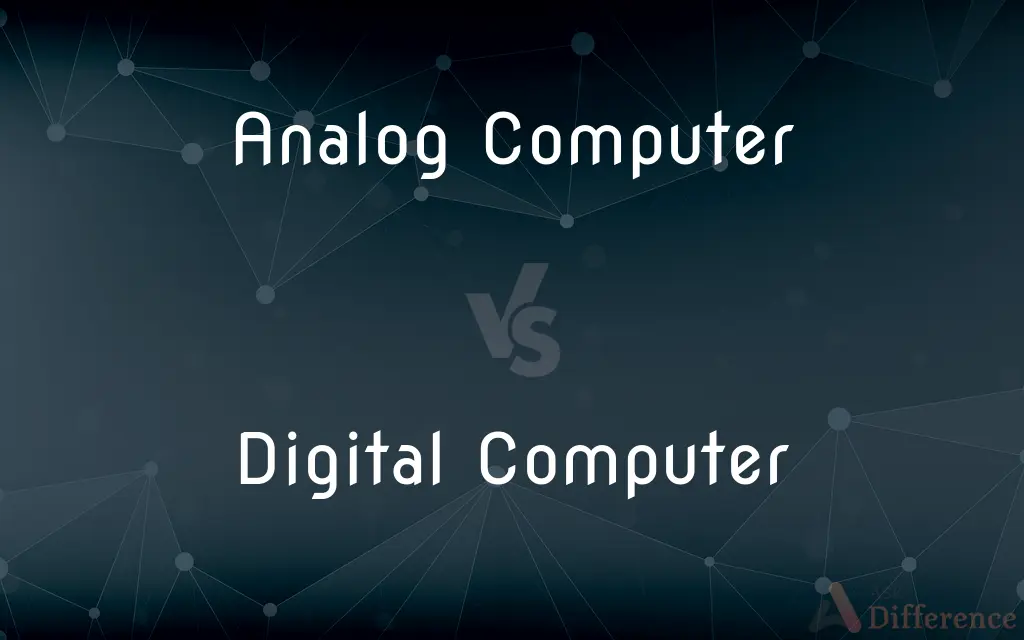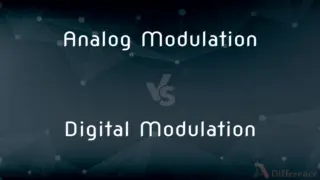Analog Computer vs. Digital Computer — What's the Difference?
By Tayyaba Rehman — Published on January 3, 2024
Analog computers process continuous data, ideal for simulations and physical processes; digital computers use binary data, suitable for complex calculations and data processing.

Difference Between Analog Computer and Digital Computer
Table of Contents
ADVERTISEMENT
Key Differences
Analog computers operate using continuous data or physical phenomena, making them suitable for simulating real-world systems like flight dynamics. Digital computers, on the other hand, use binary code (0s and 1s) to perform calculations and process data, making them versatile for a wide range of applications from basic calculations to complex programming.
In an analog computer, data is represented in a way that is analogous to the physical world, often using voltage levels, and they process this data in a continuous form. Digital computers represent data discretely and perform operations using discrete values, typically processing data in a step-by-step manner.
Analog computers excel in tasks where approximation of complex physical processes is needed, such as in certain types of scientific and engineering calculations. Digital computers are superior in handling structured, algorithmic computations, and are widely used in business, education, and entertainment.
The accuracy of an analog computer is often limited by physical factors and can be less precise than digital computers. Digital computers, with their binary precision, offer high accuracy and are capable of storing and recalling vast amounts of data with exactness.
Maintenance and design of analog computers can be complex and specialized due to their physical components. Digital computers, benefiting from standardization and technological advances, are generally more user-friendly, versatile, and easier to maintain.
ADVERTISEMENT
Comparison Chart
Data Representation
Continuous data (e.g., voltage levels)
Discrete data (binary code)
Precision
Limited by physical components
High precision and accuracy
Best Suited For
Simulating physical systems
Complex calculations, data processing
Maintenance
Often complex due to physical nature
Easier due to standardization
Use Cases
Engineering calculations, simulations
Business, education, programming, storage
Compare with Definitions
Analog Computer
Ideal for continuous process control.
The analog computer controlled the temperature in the industrial plant.
Digital Computer
Processes data using binary digits.
The digital computer calculated the complex algorithm in seconds.
Analog Computer
A computer that processes continuous data.
The flight simulator, an analog computer, replicated the aircraft's flight dynamics.
Digital Computer
Performs precise and accurate computations.
Digital computers are used in space missions for navigation and data analysis.
Analog Computer
Directly mimics physical systems.
The analog computer simulated the electrical properties of a circuit.
Digital Computer
Stores and retrieves large amounts of data.
Digital computers are essential in data centers for storing vast amounts of information.
Analog Computer
Uses physical phenomena to model problems.
An analog computer was used to solve complex differential equations in real-time.
Digital Computer
Suitable for discrete data processing.
A digital computer managed the company's extensive customer database.
Analog Computer
Operates using a continuous range of values.
Analog computers in seismology helped in interpreting seismic data.
Digital Computer
Utilizes software for diverse applications.
The digital computer ran multiple applications simultaneously for business analytics.
Common Curiosities
What is the primary use of an analog computer?
For simulating and modeling continuous physical processes.
How do digital computers represent information?
Using binary code, consisting of 0s and 1s.
Are analog computers still widely used?
Their usage has declined with the advent of powerful digital computers.
Is accuracy a strength of analog computers?
They are less precise compared to digital computers due to physical limitations.
What type of data storage do digital computers use?
They use digital storage mediums like hard drives and solid-state drives.
Can digital computers handle continuous data?
They handle data in discrete form but can simulate continuous data through algorithms.
What is a key feature of analog computers?
Their ability to process data in a form that closely represents real-world scenarios.
Can analog computers be used for data storage?
They are not typically used for data storage like digital computers.
What kind of interface do digital computers have?
They usually have user-friendly interfaces, including graphical user interfaces.
Are digital computers faster than analog computers?
Generally, yes, especially for complex and structured computations.
How has the development of digital computers impacted computing?
It revolutionized computing, leading to widespread technological advancements and applications.
Can digital computers be used for simulations?
Yes, they can simulate various systems using specialized software.
Can analog computers perform complex calculations?
They are better suited for specific types of calculations, like simulating physical phenomena.
How do analog computers handle errors?
Error handling can be more challenging due to their continuous data processing nature.
Do digital computers have versatile applications?
Yes, they are extremely versatile and used in a wide range of industries and applications.
Share Your Discovery

Previous Comparison
Analog Modulation vs. Digital Modulation
Next Comparison
Stock vs. EquitiesAuthor Spotlight
Written by
Tayyaba RehmanTayyaba Rehman is a distinguished writer, currently serving as a primary contributor to askdifference.com. As a researcher in semantics and etymology, Tayyaba's passion for the complexity of languages and their distinctions has found a perfect home on the platform. Tayyaba delves into the intricacies of language, distinguishing between commonly confused words and phrases, thereby providing clarity for readers worldwide.












































